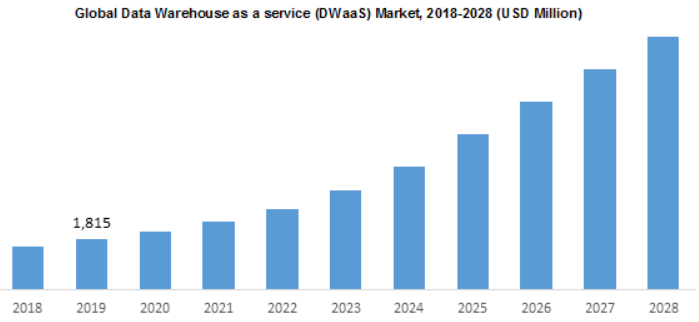What is Data Warehouse as a Service (DWaaS)? Best Service Providers
For a business operating online, data is its biggest asset. And, more importantly, the data needs to be stored safely and securely while keeping customer privacy in mind. Your data is critical, and you can’t afford to take any chances with its security. It’s now more important than ever for companies to have a secure and reliable data storage solution. This is where a data warehouse as a service or DWaaS comes into play. A DWaaS provides a cloud-based platform for collecting, storing, processing, and analyzing your data. It’s secure, reliable, and scalable, so you can be confident that your data is safe and accessible no matter what.
There are many different DWaaS providers, so it’s important to choose one that best fits your needs. Some things to consider include the size of your data warehouse, the type of data you’re storing, and your budget. With so many options available, you need to first understand what a data warehouse is, why you need it, and how to choose one that will fulfill your business needs.
In this article, we will provide an overview of a data warehouse – its structure, advantages, and implementations.
What is Data Warehouse as a Service?
A data warehouse is a type of database that is used to store, analyze, and manage data. It is designed to hold data from multiple sources so that it can be used for reporting, analytics, and other purposes. A data warehouse can be either on-premises or in the cloud.
A data warehouse as a service or DWaaS is a cloud-based data storage and processing platform that helps you collect, store, and process your data. It’s a secure and reliable way to store your data, and it’s scalable so your data warehouse grows as you grow.
Sectors that produce and consume large amounts of data on a continuous basis, and want to aggregate this divergent data from multiple sources to arrive at projections, key trends, and analytics, are major users of DWaaS.
These include the banking, finance, and insurance sectors. Other major industries using cloud-based data warehouse platforms are telecommunications and information technology, universal health care, retail, manufacturing, and government, among others.
There is also an increasing need for DWaaS solutions in the BFSI sector to reduce losses caused by baseless allegations, cyber-attacks, and phishing. These solutions are also used for predictive fraud analysis, detection of false or erroneous claims, and security enhancements.
Another application of DWaaS solutions is to quantify and assign numerical values to factors such as potential profits, credit/investment risks, and the likelihood of a policy resulting in a claim.
The healthcare sector can benefit from DWaaS solutions as they can help analyze disease patterns, the incidence of pandemics, drug efficacy, side effects, and treatment fallout.
These are just a few examples of the implementation of a DWaaS platform.
Not just large businesses, small businesses are also now in need of data warehousing services as they collect a lot of data digitally and need to seamlessly aggregate and store the data for their marketing, sales, and analytical purposes.
Why Do You Need a Data Warehousing Service?
A data warehouse supports a more successful data strategy by effectively supplying standardized, contextual data to an organization’s business intelligence tools. Improved data analytics, strategic market competition, and increased revenue are all advantages of using a data warehouse.
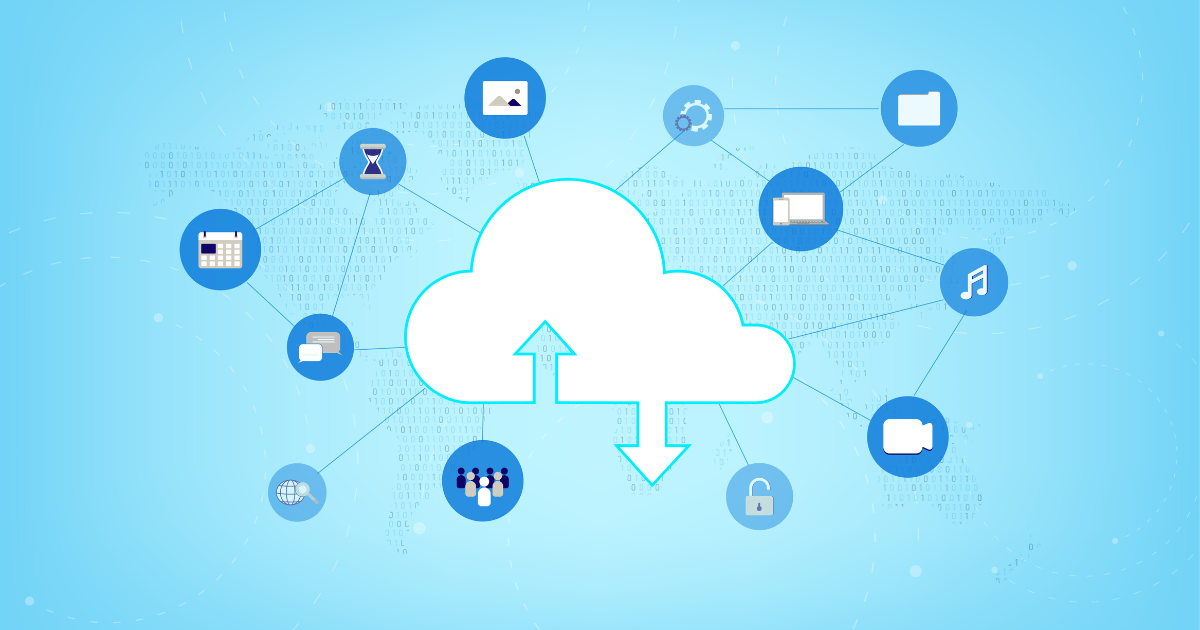
Here are some more reasons why you need a data warehousing service:
1. In-house data storage is complicated and expensive
It is expensive and complicated to store data in-house. The hardware and software costs can be significant, and maintenance is ongoing. A data warehouse service provides a cost-effective option for storing data off-site.
Moreover, cloud-based data warehouses make it easier to access and manage all your data from one place. You can easily share data between different departments and employees, making it simpler to make decisions based on accurate, up-to-date information.
2. Data warehouse as a service ensures data security
The security of cloud-based data warehouses has improved thanks to a number of significant developments, which also improve the security of corporate data as a whole.
These improvements include methods like “slave read only” setups, which prevent harmful SQL code, and encrypted columns, which safeguard private data. Some companies also create unique user groups in their data warehouse solution that can include or exclude different data pools and even provide access row by row.
3. DWaaS solutions increase efficiency and speed of operations
It takes a lot of time for a business user or a data scientist to collect data from multiple sources.
But, with data warehouse as a service (DWaaS) solutions, you can have a centralized platform to analyze data from all your business silos. This eliminates the need for manual data collection and transformation, saving you valuable time and resources. Additionally, your data scientist won’t require technical support if they need to run a quick report or sort information about any given subject matter.
A data warehouse solution makes this information easily accessible in the proper format, which enhances the effectiveness of the entire procedure.
When you get standardized data for quick data mining and analysis, it can give your business a competitive edge in crucial areas like CRM, HR, sales success, and quarterly reporting.
4. DWaaS solutions help provide a historical perspective
Without a sizable and accurate archive of historical data, no company can function. A data warehouse solution’s extensive historical data makes it feasible for corporate executives to quickly find out the sales of a major product 24 months ago.
The major performance trends that surround this retrospective research can be listed in a data warehouse, which is another crucial way to put this previous data into context.
A traditional database cannot be equivalent to the level of effectiveness that a DWaaS offers.
5. DWaaS solutions are scalable
Scalability is the most important keyword in the cloud era, and a data warehouse solution is no different. Top-notch data warehouse solution providers allow enough flexibility and scalability for increased business-wide expansions.
So when your company or firm expands, the sophisticated data warehouse solution that you pick today will be able to handle the increasing numbers of requests (though this will require more supporting hardware and a plan upgrade).
The increased efficiency of data flow due to a DWaaS solution also significantly contributes to corporate growth, which is the foundation of business scalability.
6. You can generate more revenue with better insights
Given the tremendous monetary value of data in today’s society, a tech commentator declared that “data is the new oil.”
The primary strength of a data warehouse is the ability to produce more standardized and high-quality data, which directly translates into sizable revenue increases. With better data-driven insights, you can make informed decisions, which will help you generate a higher return on investment across all company sectors. All thanks to improved business intelligence due to the data warehouse solution.
Most importantly, with smarter choices, not only the company can grow, but also enjoy the benefits of compounded revenue year over year.
7. Safely store and process data while complying with regulations
Laws like GDPR have become very stringent and customers are taking their privacy more seriously than ever.
A DWaaS provider can help you comply with data regulations and privacy requirements while storing and utilizing the data. This reduces your liabilities and your worries regarding proper processing of the data. While choosing a DWaaS, it is important for you to discuss the provider your compliance requirements and what potential obstacles could come in the way. For example, US services need to adhere to the CLOUD act and produce customer data when obligated. This does not go well with European regulators. (Read more)
What to Keep in Mind When Choosing a Warehousing Platform
Choosing a data warehousing platform for your business is a crucial decision. Fortunately, there is a wealth of information available on the major options available in the market.
You can choose the one that best suits your business needs by considering use case scenarios, budget, and other factors. These factors include:
- Security and privacy risks: Choose a platform that is secure and can protect your data privacy. Most reputable platforms offer regular security updates and protocols to keep you satisfied.
- Regulatory compliance: Make sure the platform you choose can help you comply with regulations such as GDPR, HIPAA, and Sarbanes-Oxley.
- Scalability: With cloud services, scaling is straightforward, affordable, easy, and adaptable without the need for on-premise software or infrastructure changes.
- Low entry costs: Because cloud services can work with minimal IT personnel, or other ongoing expenses, they are far more affordable at first. You may need to upgrade plans as the amount of data you want to store and process increases.
- Connectivity: Using cloud services makes it simpler to connect to other cloud services, which helps you easily process, store, and organize data.
- Availability or reliability: Cloud solutions can have very high uptime if you have a good provider, making them dependable in any situation.
You will need to sign a data processing agreement (DPA) when your company partners with or hires a third-party data processor. This is entirely acceptable and even necessary if the company is handling the personal information of EU citizens.
A healthcare provider might choose to buy cloud-based patient management software, which maintains data about people’s medical treatment, as an illustration. The software supplier is a third party who will be gathering, keeping, and sharing a patient’s personal data, even though it may be a great improvement over paper-based or spreadsheet solutions. A data processing agreement is required as a result.
The Top Data Platforms for B2B Businesses in 2022
Now, let’s take a look at the top data platforms for B2B businesses and understand what they offer.
1. Salespanel
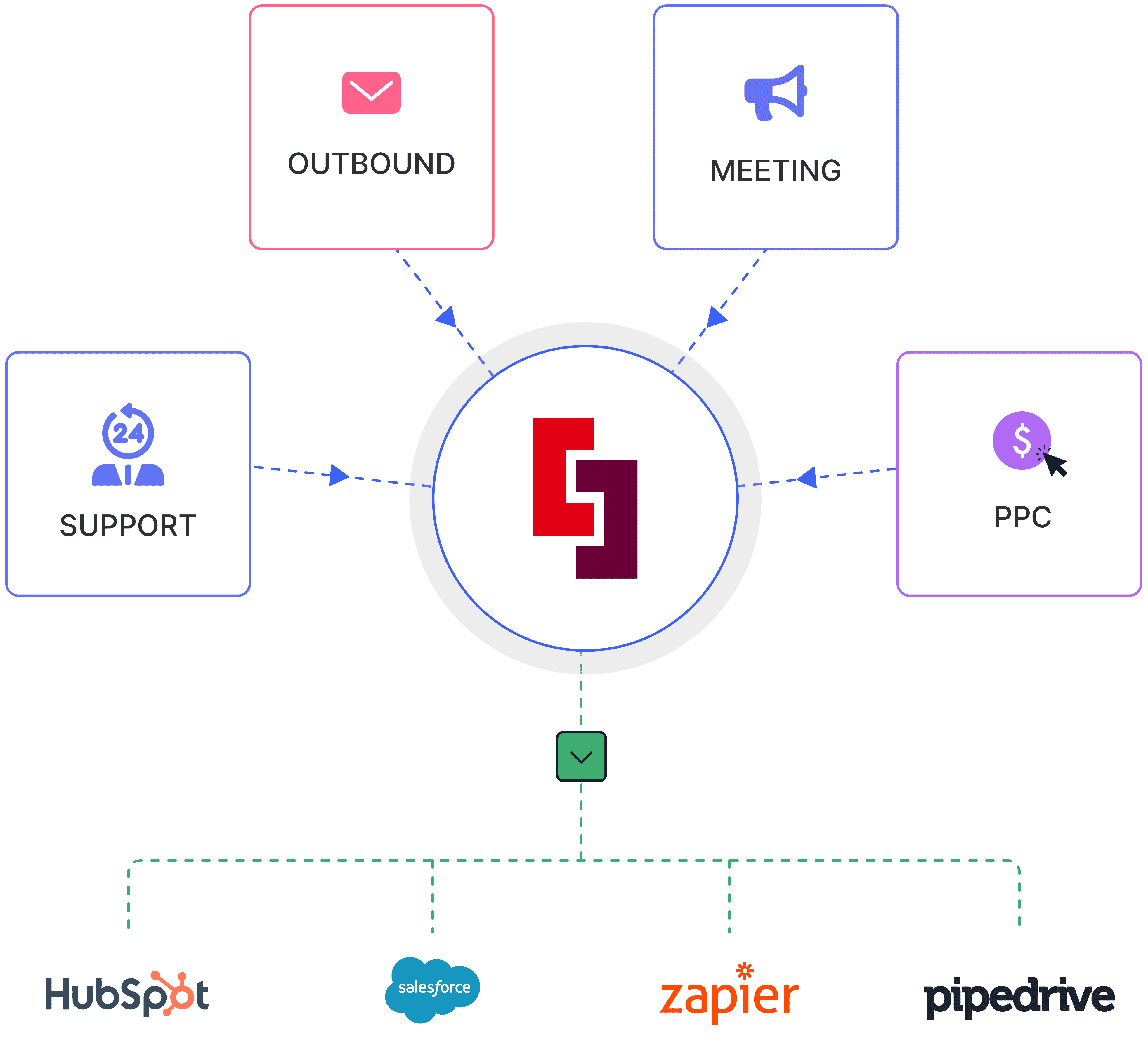
Source: Salespanel
Salespanel is a tool for B2B SMBs and Mid-Market companies to acquire, store, and process data for marketing and analytics. You can use Salespanel’s customer data platform to gather customer information and warehouse it while consentfully acquiring the said data. It can help you create cohorts of your consumers using the first-party data you collect to track customer journeys while bringing out qualified customers.
The tool aggregates data from your website and app while tracking marketing touchpoints and warehouses it securely. This data can also be plugged to your CRM to help your sales reps. With real-time visitor and lead tracking, you will be in a better position to perform informed real-time advertising & distribution actions. You can use firmographic, behavioral, and personal data along with predictive and point-based lead scoring to validate leads and accounts.
From a centralized location, you can track campaign results, qualify leads, or begin email nurturing. You can also use account-based marketing (ABM) tactics to identify high-value accounts and deliver customized consumer experiences in real-time. Use Salespanel’s pluggable nature to simplify any data synchronization.
Salespanel only collects first-party data for your business and does not monetize the data or use it for other purposes. This essentially makes it more compliant than products like Google Analytics that reuse your data or crowdsource data. The data is acquired and warehoused only when the customer provides his/her consent. This makes it a GDPR-friendly data warehouse solution for sales, marketing, and analytical requirements.
2. Segment.com

Source: Segment.com
Segment.com is another leading customer data platform (CDP) that helps businesses collect, clean, and control their customer’s data. It provides a single platform for managing customer data from any source, which makes it easy to use for businesses of all sizes.
With Segment, you can bulk load data to a centralized location at predetermined intervals rather than streaming it continuously. The platform helps you update events and objects when you load data, and it automatically changes its schema to reflect the data you’ve supplied to Segment.
3. Amazon (cloud storage)
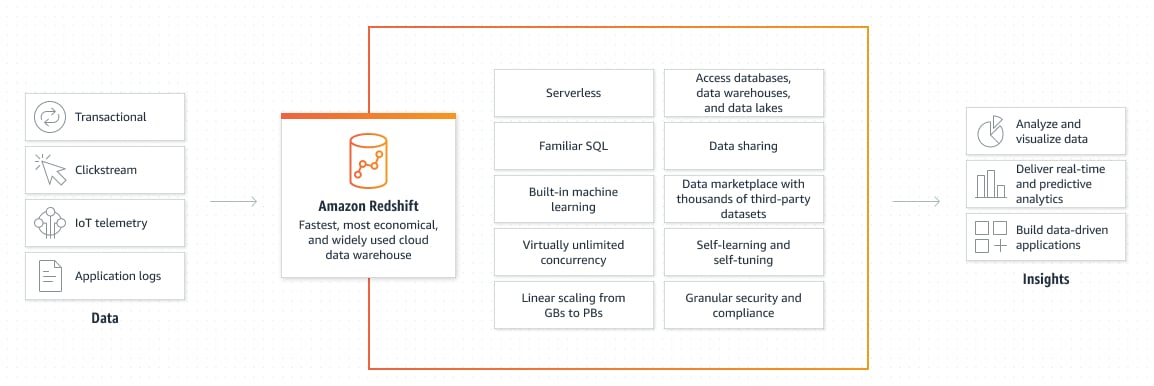
Source: Amazon Redshift
Amazon offers a cloud-based data warehousing solution called Amazon Redshift, which is part of the larger cloud-computing solution – AWS (Amazon Web Services).
Redshift is a fast, scalable data warehouse that makes it easy to analyze data from multiple sources. It integrates with other AWS services such as Amazon S3, Amazon DynamoDB, and Amazon EMR to help businesses to use data to improve customer experience, marketing, and sales.
It also offers security and compliance features to meet your data privacy and regulatory requirements.
4. Snowflake
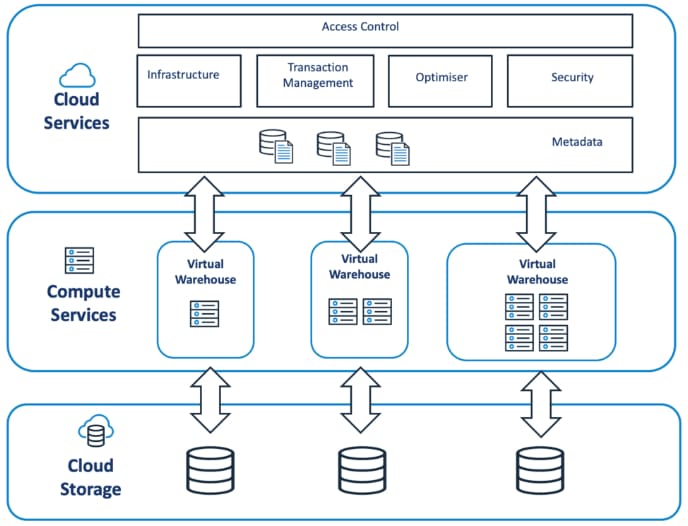
Source: analytics.today
Snowflake is a fully-managed, cloud-based data platform that offers a flexible data model that can be easily adapted to the changing needs of businesses. It allows businesses to efficiently store, query, and analyze data from a single platform.
Snowflake offers many features that make it an ideal data platform for B2B businesses, including a wide range of integrations with popular business applications and a pay-as-you-go pricing model that offers considerable savings for businesses.
Join Snowflake’s Data Cloud to easily discover and securely share live controlled data across your business, with your customers and business partners, and with any organization that is part of the Data Cloud.
What’s Next?
A data warehouse as a service (DWaaS) is an essential solution for your business to collect and organize all data from your digital marketing process, transactional systems, relational databases, and other streams, and continuously update new data. You can then leverage the data to acquire more customers and scale your business without worrying about storage and processing.
Sell more, understand your customers’ journey for free!
Sales and Marketing teams spend millions of dollars to bring visitors to your website. But do you track your customer’s journey? Do you know who buys and why?
Around 8% of your website traffic will sign up on your lead forms. What happens to the other 92% of your traffic? Can you identify your visiting accounts? Can you engage and retarget your qualified visitors even if they are not identified?
